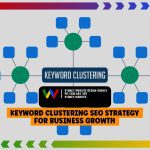SEO Services Expert’s Main Intention Is To Grow Your Business Organically With Continues Strategies

In today’s digital age, businesses are facing tougher competition than ever before. It can be challenging to stand out from the crowd. With countless companies vying for customers’ attention online.
This is where search engine optimisation (SEO) comes in. You can improve its visibility in search results, drive more traffic to your site, and ultimately grow your business. It is by optimising your website for search engines.
However, SEO is a complex and constantly evolving field. It can be challenging for businesses to keep up. This is where SEO services experts come in. Working with an SEO agency can help fire up your SEO campaign and search engine marketing efforts. You get quality SEO by working with the experts.
You can develop a customised strategy to improve your website’s rankings in search results. All without requiring a massive advertising budget. It is by working with an experienced SEO services expert.
In this blog post, we will explore the benefits of working with an SEO services expert. Also, how they can help you grow your business organically. And finally, answer some frequently asked questions about SEO.
We will also provide practical tips and strategies for optimising your website for search engines. Furthermore, explain how you can measure the success of your SEO efforts. This post will provide valuable insights into how SEO services experts can help you achieve your business goals. It is whether you’re a small business owner or a marketing professional.
Introduction
As businesses strive to reach new customers and clients through social media and the ever-growing online world, it becomes increasingly important to optimise their web presence for the wider community and search engines. This is where SEO services come in, as they are experts in helping a business achieve a higher ranking on search engine results pages (SERPs), which in return it can lead to more website visitors, leads, and sales. But what do SEO services include? And who are SEO services experts?
SEO is an acronym for “Search Engine Optimisation”. It is a long-term digital marketing strategy employed to improve a website’s visibility and organic search results in the Google search, and other global search engines. SEO services experts are professionals who can help businesses with their online digital marketing services needs by improving their website’s Google search and engine ranking to grow their business.
Table of Contents
- Expert SEO Services
- Why Is It Important to Rank in Search Engines?
- Can I Rank My Business On Google Without SEO?
- What Is Most Effective, Advertising to SEO?
- How Long Does it Take to Get my Online Business Noticed?
- Is My SEO Services Effective for My Business
- FAQs SEO Services Expert
- Why Your Business Needs an SEO Services Expert
- Top 50 SEO Questions Answered by SEO Specialists
Expert SEO Services

An SEO service expert is a professional who specialises in optimising websites for search engines. They are trained and experienced in the best practices of search engine optimisation. They are familiar with the latest trends and techniques in the field of search engine optimisation too.
An SEO service expert can help businesses improve their website’s ranking and visibility. They improve search engine results pages (SERPs) for specific keywords and phrases. They do this by optimising various elements on the website. Some of which are content, metadata, site structure, and backlinks.
An SEO service expert will start by conducting a thorough analysis of the website’s current performance. This includes its ranking on search engines. Furthermore, the quality and relevance of its content and its technical structure. Based on this analysis, they will develop a comprehensive SEO strategy. One that is tailored to the specific needs and goals of the business.
Some of the services that an SEO service expert might provide include:
Keyword Research
Identifying relevant and high-traffic social media marketing and keywords and phrases. One that the businesses should also target keywords in their own social media marketing content.
On-Page Optimisation
Optimising various elements on-page optimisation of the website. Some of which are titles, descriptions, headings, and content. This is to make it more search engine friendly.
Technical SEO
Improving the technical aspects of the website to improve its ranking and user experience. Some examples are site speed, mobile responsiveness, and security,
Link Building
Building high-quality backlinks from other reputable websites. It is to improve the website’s authority and visibility.
Analytics Tracking
Monitoring and analysing the website’s performance over time. It is by using tools like Google Analytics to identify areas for improvement. Moreover, measure the effectiveness of the SEO strategy.
An SEO service expert can help businesses improve their website’s ranking and visibility on search engines. Moreover, attract more organic traffic and grow their business. All without needing a massive advertising budget.
Why Is It Important To Rank In Search Engines?

Ranking high in search engines is crucial for businesses that want local customers to succeed online. Here are some of the key reasons why it’s important for local business to rank in search engines:
Increased Visibility
It is more likely for an ecommerce site to be seen by potential customers. This is when a website ranks high on search engine results pages (SERPs). This increased visibility can lead to more traffic. Furthermore, this can provide more leads, and ultimately more sales.
Credibility And Trust
Websites that rank high in search engines are often seen as more credible and trustworthy by users. This is because search engines like Google use complex algorithms. These algorithms determine which websites are most relevant and useful for a given search query.
So, it’s a good indication if a website is ranking high in search engines. It means that it is a reliable and authoritative source of information.
Cost-Effectiveness
Search engine ranking is a cost-effective way to attract organic traffic to a website. Unlike paid advertising, it doesn’t require a gigantic investment. Furthermore, the long-term benefits can be significant. It is especially for businesses with limited advertising budgets.
Long-Term Results
Search engine optimisation (SEO) is a long-term strategy. One that requires consistent effort and patience, but the results can be long-lasting.
Ranking high in search engines can continue to attract organic traffic to a website for months or even years to come. It is unlike paid advertising, which stops generating traffic as soon as the campaign ends,
Overall, ranking high in search engines is essential for businesses. Ones that want to grow their online presence and attract more potential customers. Businesses can improve their visibility, credibility, and long-term success. It is by working with an SEO services expert to optimise their website for search engines,
Can I Rank My Business On Google Without SEO?

While it is possible to rank in Google’s search results without SEO, it’s important to note that the chances of achieving a high ranking without SEO are very slim. Here are some reasons why:
Competition
Billions of websites are on the internet. Many of them are competing for the same keywords and phrases. Without SEO, it’s unlikely that your website will be able to compete with other websites for targeted keywords. Especially ones that are actively optimising their content and website for search engines.
Search Engine Algorithms
Google and other search engines use complex algorithms. It determines which websites should rank highest for specific search queries. These algorithms consider hundreds of factors, including the quality and relevance of the content, the website’s structure and design, and the number and quality of backlinks.
Without SEO, it’s unlikely that your website will meet all the criteria that these algorithms use to rank websites.
User Experience
Search engines like Google prioritise ranking websites that that offer a positive user experience. This means that websites that are easy to navigate, load quickly, and have high-quality content are more likely to rank high on SERPs. Without SEO, it’s unlikely that your website will be able to provide the kind of user experience that search engines are looking for.
Long-Term Success
Even if you can achieve a high ranking on the Google search, without SEO, it’s unlikely that this success will last. As other websites optimise their content and websites for search engines, it’s likely that your website will be pushed down the rankings over time.
In contrast, websites that invest in SEO are more likely to achieve long-term success and maintain a high ranking on search engines.
Overall, while it is technically possible to rank on Google without SEO, the chances of achieving a high ranking without SEO are very slim.
For businesses that want to grow their online presence and attract more potential customers, investing in SEO is a crucial, overall marketing strategy, that can help them achieve long-term success on search engines.
What Is Most Effective Advertising To SEO?

When it comes to promoting your business online, both advertising and SEO can be effective strategies. However, the most effective approach will depend on your specific goals and budget. Here are some key factors to consider:
Budget
One of the main advantages of SEO is that it can be a cost-effective way to attract organic traffic to your website. While there is some initial investment involved in optimising your website for search engines, the long-term benefits can be significant, especially for businesses with limited advertising budgets.
In contrast, advertising can be expensive, especially for businesses that want to reach a large audience. Check whether working with a digital marketing agency would be beneficial over traditional advertisement.
Long-Term Vs. Short-Term Results
Advertising can be a great way to generate quick results, such as increased website traffic or leads. However, the benefits of advertising tend to be short-lived, and as soon as you stop paying for ads, the traffic, and leads will dry up. SEO strategies can give different results, some take a short time while others take longer.
SEO is a long-term strategy that requires consistent effort and patience, but the results can be long-lasting. By optimising your website for search engines, you can attract organic traffic to your website for months or even years to come.
Target Audience
Another important factor to consider is your target audience. If your target audience is active on social media or other online platforms where advertising is prevalent, then advertising may be an effective way to reach them. However, if your target audience is more likely to use search engines to find information about products or services like yours, then investing in SEO may be a more effective strategy.
Branding
While both advertising and SEO can help to increase brand awareness, they do so in different ways. Advertising is a more direct way of promoting your brand, as it involves placing ads that are designed to attract attention and generate interest in your products or services.
In contrast, SEO is a more indirect way of promoting your brand, as it involves optimising your website and content so that it appears high in search engine rankings. This can help to establish your brand as a reliable and authoritative source of information within your industry.
Overall, while both advertising and SEO can be effective strategies for promoting your business online, the most effective approach will depend on your specific goals and budget. By working with an SEO services expert, or local SEO services from SEO companies, you can develop a customised overall digital marketing strategy that is tailored to your unique needs and objectives.
How Long Does It Take To Get My Online Business Noticed?

One of the most common questions that business owners have when it comes to SEO is how long it will take to see results. Unfortunately, there is no simple answer to this question, as the timeline for achieving results can vary widely depending on several factors.
Here are some factors that can impact how long it takes to get your online business noticed:
Competition
If you are in a highly competitive industry, it may take longer to achieve significant rankings in search engines. This is because there are likely many other businesses vying for the same valuable keywords, and search terms, making it more difficult to stand out.
Existing Website
If your website is already optimised for search engines, it may take less time to see results than if you are starting from scratch. Conversely, if your website is outdated or has technical difficulties that need to be addressed, it may take longer to see results.
Content Quality
The quality of your website content can also impact how quickly you see results. If your content is well-written, informative, and optimised for keywords, it may rank higher in search engines more quickly than content that is poorly written or not optimised.
Keyword Selection
The keywords you choose to target can also impact how quickly you see results. If you select highly competitive keywords, it may take longer to rank keywords to achieve significant rankings than if you select less competitive, long-tail keywords.
SEO Strategy
Finally, your overall SEO strategy will also impact how long it takes to see results. A comprehensive SEO strategy that includes both on-page optimisation and off-page activities like link building can help to accelerate results.
In general, it can take several months to a year or more to see significant results from SEO efforts. However, by working with an experienced SEO services expert, you can develop a customised strategy that is tailored to your specific needs and goals, and that will help to accelerate the timeline for achieving results.
Is My SEO Services Effective For My Business

As a business owner, it’s important to regularly evaluate the effectiveness of your SEO services to ensure that you are getting the most out of your investment. Here are some key factors to consider when assessing the effectiveness of your SEO services:
Rankings
One of the primary goals of SEO is to improve your rankings in search engines for relevant keywords and search terms. If your SEO services are effective, you should see improvements in your rankings over time. It’s essential to track your rankings regularly and compare them to your competitors to gauge the effectiveness of your SEO efforts.
Traffic
Improved keyword rankings, should also lead to increased traffic to your website. If your SEO services are effective, you should see a steady increase in organic search traffic to your website over time. It’s critical to track your traffic sources to ensure that your SEO efforts are driving meaningful traffic to your site.
Conversions
Ultimately, the effectiveness of your SEO services should be measured in terms of conversions. Are visitors to your website taking desired actions, such as making a purchase or filling out a contact form? If not, it may be necessary to refine your SEO strategy to better target your ideal audience and improve your website’s user experience.
Return of Investment
Finally, it’s important to consider the return on investment (ROI) of your SEO services. Are you seeing a positive ROI from your SEO efforts? If not, it may be time to reevaluate your SEO strategy or consider working with a different SEO services provider.
By regularly assessing the effectiveness of your SEO services, you can ensure that you are getting the most out of your investment and making data-driven decisions to improve your online visibility and drive meaningful results for your business.
SEO Services Expert Frequently Asked Questions
What Is An SEO Service Expert?
How Do SEO Services Experts Help Businesses?
How Long Does It Take To See Results From SEO Services?
How Much Do SEO Services Cost?
How Do I Choose The Right SEO Services Expert For My Business?
Are SEO Services Necessary For All Businesses?
What distinguishes SEO companies from other digital marketing agencies?
These agencies excel in both on-page and off-page SEO, optimising web pages and web server settings for higher Google rankings. They leverage technical SEO and content marketing to improve search marketing efforts and complement strategies with Google Ads campaigns and social media ads. SEO companies prioritise effective SEO practices and utilise key SEO metrics to measure SEO performance and ROI.
For small businesses seeking local SEO, partnering with an SEO company like SEO Melbourne Agency ensures targeted marketing campaigns and increased online visibility within the Australian SEO landscape. SEO agencies offer cost-effective solutions, whether through SEO freelancers or full-service marketing services, making them invaluable for businesses aiming for long-term search engine success.
How can an experienced SEO agency boost my online presence?
Through SEO marketing and digital marketing, including Google Ads campaigns and paid ads, they elevate your online marketing efforts, ensuring ecommerce SEO success in Melbourne and beyond.
How do seasoned SEO experts craft effective SEO campaigns?
These search engine optimization experts provide SEO training and streamline the SEO process, offering search engine optimization services at competitive SEO cost compared to other SEO companies.

Why Your Business Needs An SEO Services Expert

In today’s digital age, having a strong online presence is essential for businesses of all sizes. One of the key components of a strong online presence is search engine optimization (SEO) thru the help for SEO agencies.
SEO helps to improve your website’s visibility in search results, driving more traffic and potential customers to your site. Here are some reasons why your business growth brand needs an SEO services expert for your SEO campaigns:
By optimising your website for search engines, an SEO services expert can help to drive more traffic to your site. This traffic is highly targeted, meaning that it consists of people who are actively searching for products or services like yours. This makes it more likely that they will convert into paying customers.
Top 50 SEO Questions Answered by SEO Specialists
1. What is SEO, and why is it important for businesses?
SEO, or Search Engine Optimisation, is a vital component of digital marketing strategy, particularly for businesses aiming to boost website traffic and enhance business growth.
As a full service digital agency with a focus on search engine marketing, we at Sydney Digital Marketing understand its significance. Utilising bespoke SEO strategies and white hat techniques, our SEO specialists ensure your website ranks high on major search engines, driving more organic search results.
With monthly SEO reports and on page optimisation, we optimise your site to reach your target audience effectively, resulting in increased visibility, credibility, and ultimately, conversions.
Trust our Sydney SEO team to elevate your digital presence and propel your business forward.
2. How does SEO work?
SEO works by optimising various aspects of a website, including on-page elements like content and meta tags, off-page factors like backlinks, and technical aspects like site speed and mobile-friendliness.
By improving these elements, a website can rank higher in search results and attract more organic traffic.
3. What are the main components of SEO?
The main components of SEO include on-page optimisation, off-page optimisation, and technical SEO. On-page optimisation involves optimising content, meta tags, and other elements on individual web pages. Off-page optimisation focuses on building backlinks and improving the website’s authority. Technical SEO deals with factors like site speed, mobile-friendliness, and crawlability.
4. How does SEO differ from SEM?
SEO (search engine optimisation) is focused on improving organic search rankings and attracting organic traffic, while SEM (search engine marketing) involves paid advertising strategies like Google Ads to increase visibility in search results.
5. What are the benefits of hiring an experienced SEO agency?
Hiring an experienced SEO agency can bring several benefits, including expertise in SEO best practices, access to advanced tools and technologies, customised strategies tailored to your business goals, and the ability to track and measure results effectively.
6. How can SEO help businesses achieve growth?
SEO can help businesses achieve growth by increasing their online visibility, attracting more organic traffic, generating leads and conversions, improving brand awareness and credibility, and ultimately driving revenue and profitability.
7. What is a local SEO campaign, and why is it important for local businesses?
A local SEO campaign is focused on optimising a website to rank higher in local search results, especially for location-based queries. It’s important for local businesses because it helps them attract nearby customers who are searching for products or services in their area.
8. What are some ethical SEO practices that businesses should follow?
Ethical SEO practices include following search engine guidelines, avoiding black hat techniques like keyword stuffing and link schemes, prioritising user experience and quality content, and focusing on long-term, sustainable results.
9. How can businesses measure the success of their SEO traffic?
Businesses can measure the success of their SEO traffic by tracking key metrics like organic traffic, keyword rankings, conversion rates, bounce rates, and ROI (return on investment). Tools like Google Analytics and Google Search Console can help monitor these metrics.
10. What are the key differences between on-page SEO and off-page SEO?
On-page SEO involves optimising elements on individual web pages, such as content, meta tags, and internal links, to improve search rankings. Off-page SEO focuses on building external links, social signals, and other factors that influence the website’s authority and reputation.
11. Why is content marketing important for SEO?
Content marketing is important for SEO because it helps businesses create valuable, relevant, and engaging content that attracts organic traffic, earns backlinks, and improves search rankings. High-quality content also enhances user experience and encourages social sharing.
12. How can businesses choose the right SEO agency for their needs?
Businesses can choose the right SEO agency by considering factors like experience, expertise, reputation, client testimonials, case studies, pricing, communication style, and alignment with their business goals and values.
13. What is the role of link building in an effective SEO strategy?
Link building plays a crucial role in an effective SEO strategy by improving the website’s authority, credibility, and visibility in search results. High-quality backlinks from reputable websites signal to search engines that the site is trustworthy and relevant.
14. How does mobile SEO differ from desktop SEO?
Mobile SEO focuses on optimising a website for mobile devices, ensuring fast loading times, responsive design, and intuitive navigation. With the increasing use of smartphones and tablets, mobile SEO has become essential for reaching and engaging mobile users.
15. What are some common pitfalls to avoid in SEO?
Some common pitfalls to avoid in SEO include keyword stuffing, duplicate content, thin or low-quality content, slow loading times, broken links, poor site architecture, and ignoring technical SEO issues.
16. What role does content marketing play in SEO?
Content marketing plays a crucial role in SEO by providing valuable, relevant, and engaging content that attracts organic traffic, earns backlinks, and improves search rankings. High-quality content also enhances user experience and encourages social sharing.
17. How can businesses leverage social media advertising for SEO?
Businesses can leverage social media advertising for SEO by promoting their content on social platforms, engaging with their audience, building brand awareness and authority, and earning social signals that influence search rankings.
18. What is the importance of a solid SEO strategy for business success?
A solid SEO strategy is essential for business success because it helps businesses increase their online visibility, attract more organic traffic, generate leads and conversions, and ultimately drive revenue and profitability.
19. How can businesses avoid lock-in contracts when hiring an SEO agency?
Businesses can avoid lock-in contracts by carefully reviewing the terms and conditions of the SEO agency agreement, negotiating flexible terms, setting clear expectations upfront, and prioritising transparency and accountability in the partnership.
20. What are the key elements of a successful SEO campaign?
The key elements of a successful SEO campaign include comprehensive keyword research, on-page optimisation, off-page optimisation, technical SEO, content creation, link building, and regular monitoring and optimisation based on performance metrics.
21. What is the role of monthly SEO reports in tracking campaign progress?
Monthly SEO reports provide valuable insights into campaign performance, including key metrics like organic traffic, keyword rankings, backlink profile, and conversion rates. These reports help businesses track progress, identify trends, and make informed decisions to optimise their SEO strategy.
22. How can businesses achieve first-page rankings in search engine results?
Achieving first-page rankings in search engine results requires a combination of factors, including comprehensive keyword research, on-page optimisation, high-quality content creation, strategic link building, and ongoing monitoring and optimisation based on search engine algorithms.
23. What are some effective SEO strategies for small businesses with limited budgets?
Some effective SEO strategies for small businesses with limited budgets include focusing on long-tail keywords, optimising local SEO, leveraging user-generated content and social media, building relationships with influencers, and investing in high-impact tactics that deliver maximum ROI.
24. What are the best practices for conducting keyword research in SEO?
Best practices for conducting keyword research in SEO include identifying relevant keywords and phrases related to your business, analysing search volume and competition, targeting long-tail keywords with low competition, and prioritising high-value keywords that align with your business goals.
25. How can businesses optimise their website for local SEO?
Businesses can optimise their website for local SEO by creating and optimising Google My Business listings, optimising on-page elements like title tags and meta descriptions with local keywords, building citations and local backlinks, and encouraging customer reviews and testimonials.
26. What is the importance of user experience in SEO?
User experience is important in SEO because search engines like Google prioritise websites that provide a positive user experience, including fast loading times, intuitive navigation, mobile-friendliness, and high-quality content. A better user experience leads to higher engagement, lower bounce rates, and improved search rankings.
27. How can businesses stay updated on the latest SEO trends and best practices?
Businesses can stay updated on the latest SEO trends and best practices by following reputable SEO blogs and publications, attending industry conferences and webinars, networking with other professionals in the field, and investing in ongoing training and education for their team.
28. What are some common misconceptions about SEO?
Some common misconceptions about SEO include the belief that it’s a one-time effort, that keyword density is the most important factor, that link building is dead, and that SEO is only about ranking higher in search results rather than providing value to users and meeting their needs.
29. How can businesses optimise their website for voice search?
Businesses can optimise their website for voice search by targeting conversational keywords and phrases, optimising content for featured snippets, providing clear and concise answers to common questions, and improving site speed and mobile-friendliness for a better user experience.
30. What role does structured data markup play in SEO?
Structured data markup, also known as schema markup, helps search engines understand the content and context of a web page, leading to enhanced visibility and richer search results. It can improve click-through rates, increase traffic, and provide a better user experience.
31. What are some effective strategies for building high-quality backlinks?
Some effective strategies for building high-quality backlinks include creating valuable and shareable content that attracts natural links, reaching out to relevant influencers and bloggers for collaborations, guest posting on authoritative websites, and participating in industry forums and communities.
32. How can businesses recover from a Google algorithm update that negatively impacts their search rankings?
Businesses can recover from a Google algorithm update by conducting a thorough audit of their website, identifying any issues that may have caused the drop in rankings, making necessary improvements to comply with Google’s guidelines, and focusing on delivering high-quality content and a positive user experience.
33. What are some key metrics to track in an SEO campaign?
Some key metrics to track in an SEO campaign include organic traffic, keyword rankings, backlink profile, bounce rate, time on page, conversion rate, ROI (return on investment), and overall website visibility in search engine results pages (SERPs).
34. How can businesses optimise their website for featured snippets?
Businesses can optimise their website for featured snippets by targeting question-based keywords, providing clear and concise answers in their content, structuring content in a format that’s easy for search engines to understand, and optimising meta tags and headings for relevance and clarity.
35. What are the benefits of hiring an SEO agency with experience in ecommerce SEO?
Hiring an SEO agency with experience in ecommerce SEO can bring several benefits, including expertise in optimising product pages, category pages, and navigation for better search visibility, improving site architecture and internal linking for enhanced user experience, and driving more traffic and sales through organic search.
36. How can businesses improve their website’s page speed for better SEO performance?
Businesses can improve their website’s page speed for better SEO performance by optimising images and multimedia content, minifying CSS and JavaScript files, leveraging browser caching and content delivery networks (CDNs), reducing server response times, and using responsive design for mobile-friendliness.
37. What are the best practices for conducting a technical SEO audit?
Best practices for conducting a technical SEO audit include reviewing site architecture and URL structure, analysing crawlability and indexability issues, checking for duplicate content and canonicalization errors, evaluating site speed and mobile-friendliness, and identifying and fixing broken links and redirects.
38. How can businesses optimise their website for international SEO?
Businesses can optimise their website for international SEO by creating separate country-specific or language-specific versions of their site, using hreflang tags to indicate language and regional targeting, optimising content and meta tags for local keywords and cultural nuances, and building backlinks from relevant international websites.
39. What are the key factors to consider when choosing keywords for SEO?
Key factors to consider when choosing keywords for SEO include relevance to your business and target audience, search volume and competition, user intent and behaviour, seasonality and trends, and long-tail variations that reflect specific topics or questions related to your industry.
40. What is the role of user intent in SEO, and how can businesses optimise for it?
User intent refers to the underlying motivation or purpose behind a user’s search query, whether it’s informational, navigational, or transactional. Businesses can optimise for user intent by understanding their target audience’s needs and preferences, creating relevant and valuable content that aligns with different stages of the buyer’s journey, and providing clear calls-to-action to guide users toward their desired outcome.
41. How can businesses leverage video content for SEO?
Businesses can leverage video content for SEO by optimising video titles, descriptions, and tags with relevant keywords, creating engaging and shareable videos that attract natural backlinks and social signals, embedding videos on relevant web pages to increase dwell time and reduce bounce rates, and promoting videos across social media and other digital channels to reach a wider audience.
42. What is the role of user-generated content in SEO, and how can businesses encourage it?
User-generated content (UGC) plays a valuable role in SEO by providing fresh, authentic, and diverse content that attracts organic traffic, earns backlinks, and enhances user engagement and social proof. Businesses can encourage UGC by soliciting reviews and testimonials, hosting contests and giveaways, featuring user-generated photos and videos, and fostering community engagement through forums and social media.
43. What are the benefits of using long-form content for SEO?
Long-form content offers several benefits for SEO, including the ability to cover complex topics in depth, provide comprehensive answers to user queries, target a wider range of keywords and search queries, earn more backlinks and social shares, increase dwell time and reduce bounce rates, and establish authority and expertise in your niche.
44. How can businesses optimise their website for voice search?
Businesses can optimise their website for voice search by targeting conversational keywords and phrases, optimising content for featured snippets, providing clear and concise answers to common questions, and improving site speed and mobile-friendliness for a better user experience.
45. What is the role of structured data markup in SEO, and how can businesses implement it?
Structured data markup, also known as schema markup, helps search engines understand the content and context of a web page, leading to enhanced visibility and richer search results. Businesses can implement structured data markup by adding schema.org markup to their HTML code, using Google’s Structured Data Markup Helper, and testing the markup with Google’s Structured Data Testing Tool.
46. How can businesses optimise their website for mobile SEO?
Businesses can optimise their website for mobile SEO by implementing responsive design to ensure that the site adapts to different screen sizes and devices, optimising site speed for fast loading times on mobile devices, optimising content and navigation for mobile users, and leveraging mobile-specific features like click-to-call buttons and location-based targeting.
47. What are some common SEO mistakes to avoid?
Some common SEO mistakes to avoid include ignoring technical SEO issues, neglecting on-page optimisation, focusing on quantity over quality when building backlinks, neglecting mobile optimisation, keyword stuffing, using outdated or black hat SEO tactics, and failing to track and analyse performance metrics.
48. How can businesses leverage social media marketing to enhance their SEO efforts?
Businesses can leverage social media marketing to enhance their SEO efforts by promoting their content on social platforms to increase visibility and attract backlinks, engaging with their audience to build brand awareness and authority, and earning social signals that influence search rankings.
49. What is the role of content marketing in SEO, and how can businesses create effective content?
Content marketing plays a crucial role in SEO by providing valuable, relevant, and engaging content that attracts organic traffic, earns backlinks, and improves search rankings. Businesses can create effective content by conducting keyword research to identify relevant topics and keywords, addressing user intent and needs, providing comprehensive and well-researched information, and optimising content for readability, shareability, and search visibility.
50. How can businesses measure the success of their SEO efforts, and what are some key performance indicators (KPIs) to track?
Businesses can measure the success of their SEO efforts by tracking key performance indicators (KPIs) such as organic traffic, keyword rankings, backlink profile, conversion rates, bounce rates, time on page, and ROI (return on investment). By monitoring these metrics regularly, businesses can assess the effectiveness of their SEO strategy and make data-driven decisions to optimise their performance and achieve their goals.




















































